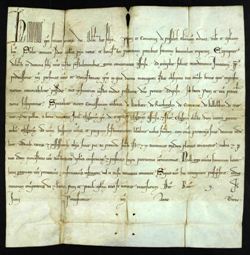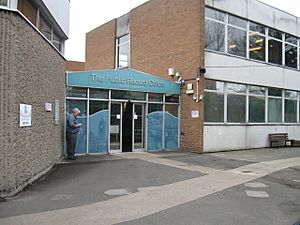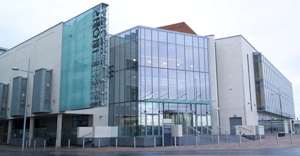Public Record Office of Northern Ireland facts for kids
 |
|
| Agency overview | |
|---|---|
| Formed | 1924 |
| Jurisdiction | Northern Ireland, Government of the United Kingdom |
| Headquarters | 2 Titanic Boulevard, Titanic Quarter, Belfast, BT3 9HQ |
| Minister responsible |
|
| Parent department | Department for Communities (DfC) |
| Key document |
|
The Public Record Office of Northern Ireland (PRONI) is a special place in Belfast, Northern Ireland. Think of it as a huge library or museum for important papers and documents. It's where the government keeps official records, but it also looks after private letters, diaries, and other historical items.
PRONI is different from other places that keep records in the United Kingdom. It holds both official government papers and private family or business documents. It acts like a national archive, a manuscripts department for a national library, and a county record office all rolled into one. This makes PRONI a very unique place for history in Northern Ireland!
Contents
History: How PRONI Started and Grew
PRONI was created by a law called the Public Records Act in 1923. It first opened its doors to the public on March 3, 1924. Its first home was on the fourth floor of an old linen warehouse in central Belfast.
One of the first big challenges for PRONI was to find copies of records that were lost. Many important documents were destroyed in a fire at the Four Courts building in Dublin in 1922. Dr. David A. Chart, the first person in charge (called the Deputy Keeper), worked hard to replace these lost records. He asked lawyers, business people, politicians, churches, and even noble families for copies of their documents.
Moving to New Homes
Because Dr. Chart was so good at collecting records, PRONI quickly needed more space. In 1933, it moved to a new spot in central Belfast, inside the Royal Courts of Justice, Belfast. But it wasn't until 1965 that plans were approved for a building made just for records.
This new, purpose-built building opened in 1972 at Balmoral Avenue. It was the first new record office built in the UK since 1838! Over the years, PRONI has moved between different government departments. In 2016, it became part of the new Department for Communities (DfC).
Relocation to Titanic Quarter: A Modern Home
In March 2011, PRONI moved to an exciting new building. Its current home is at 2 Titanic Boulevard in the Titanic Quarter of Belfast. This new building cost £29 million and is designed specifically for storing and accessing historical records.
What's Inside the New Building?
The new PRONI building has a much bigger public search room. There's a reading room with plenty of seats, many with power for laptops. It also has a Wi-Fi cafe, special machines for reading old microfilms, and self-service digital cameras for copying documents.
You can also find electronic information points and public art inside the building. There's a lecture theatre for talks and dedicated space for exhibitions.
Getting There is Easy
PRONI is easy to reach from Belfast City Hall using public transport. The Metro (Belfast) bus services (26, 26A, 26B) and the Belfast Rapid Transport Glider Service (G2) go to Titanic Quarter. It's also close to the Titanic Quarter railway station and George Best Belfast City Airport.
The Titanic Quarter is a lively area. It's home to popular tourist spots like Titanic Belfast, HMS Caroline, SS Nomadic, the SSE Arena, and Titanic Studios. You might know Titanic Studios as the "Paint Hall Studios," where the TV show Game of Thrones was filmed!
Current Organisation: What PRONI Does Today
Records: A Treasure Trove of History

PRONI holds an incredible amount of history. If you lined up all its records, they would stretch for 54 kilometres! Most of these records are from around 1600 to today. But some are much older, going back to the early 13th century. The oldest document is a special letter from Pope Honorius III, dated all the way back to 1219.
The records at PRONI mostly relate to present-day Northern Ireland. However, they also have documents from other parts of Ireland. These often come from private families or groups. For example, they hold papers from the Kenmare family in County Kerry and the Lissadell family in County Sligo.
Accessing Records: How to Explore History
It doesn't cost anything to visit PRONI and look at the records. If you're a new visitor, you just need to show a photo ID to register. Anyone over 16 can register and use the research facilities.
You can find what you're looking for using PRONI's electronic catalogue. Once you find a document you want to see, you order it using their system. You can order up to five documents at a time. Since December 2016, visitors have been allowed to take photos of many records using their own cameras.
PRONI also lets you look at the most up-to-date birth, marriage, and death records. These are kept by the General Register Office (Northern Ireland).
The 20-Year Rule
In 2011, a new rule was put in place to make official records available faster. This "20-year Rule" means that most government records are released to the public after 20 years, instead of 30. This change is happening gradually over 10 years. Each year, two years' worth of records are reviewed and then made public.
Online Records: History at Your Fingertips
The PRONI website has many free online resources you can use from home. These include:
- The PRONI electronic catalogue: A searchable list of all their records.
- A searchable wills database: Details about wills from 1858 to 1965.
- Valuation records: Information about property values from 1864 to 1933.
- Historic Ordnance Survey maps: Old maps from 1832 to 1996.
- Ulster Covenant signatories of 1912: A fully searchable list of people who signed the Ulster Covenant.
- Northern Ireland street directories: Old phone-book-like listings from 1819 to 1900.
- Pre-1840 Freeholders Registers and Poll Books: Records of people who could vote before 1840.
- Links to PRONI records on Flickr: Photos of documents.
- The Conflict Archive on the Internet (CAIN): Information about the Troubles in Northern Ireland.
- PRONI Web Archive: A collection of old Northern Ireland websites.
Events Programme: Learning and Discovery
PRONI hosts many events throughout the year. These include talks, conferences, book launches, and exhibitions. Many of these events are held with other museums and cultural groups. You can find details on the PRONI website or by signing up for their monthly newsletter, PRONI Express.
See also
 | Kyle Baker |
 | Joseph Yoakum |
 | Laura Wheeler Waring |
 | Henry Ossawa Tanner |



